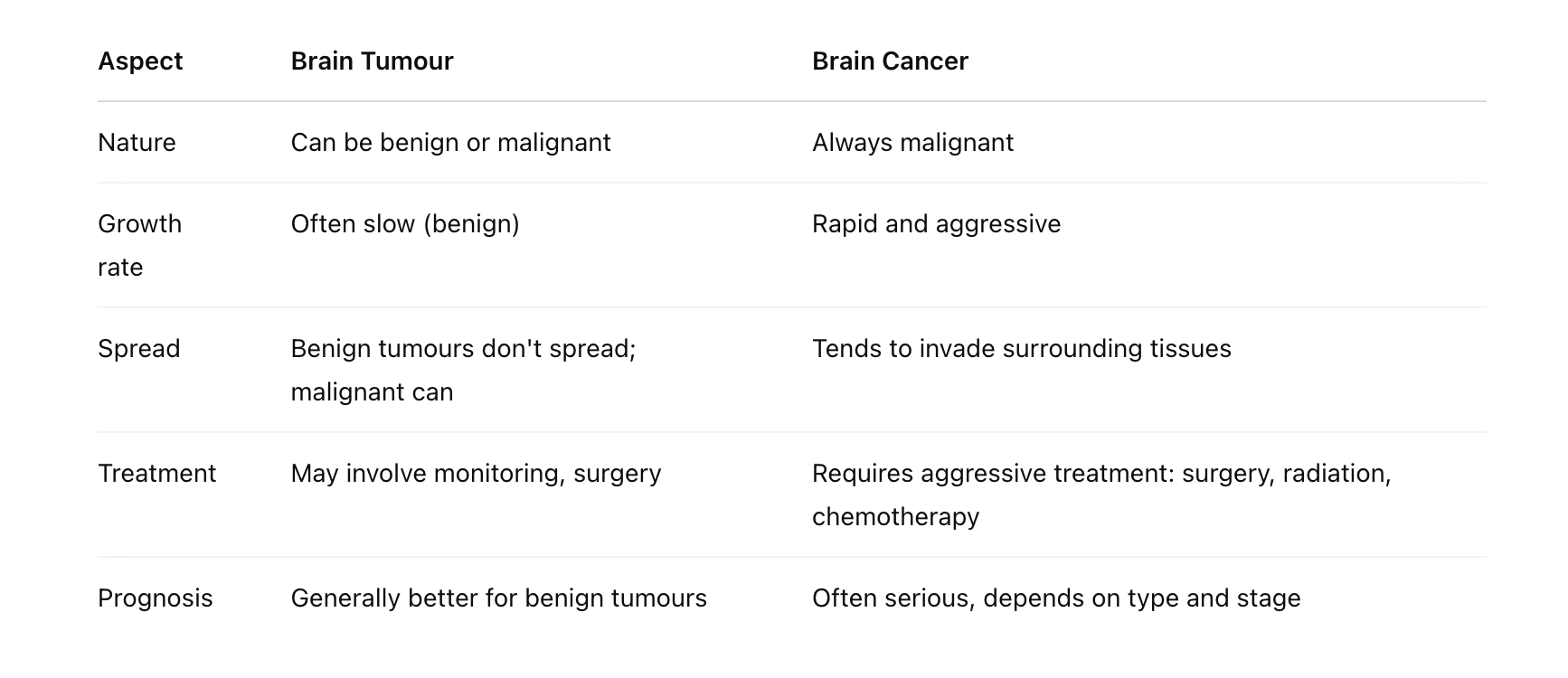Defining the terms
A brain tumour refers to any abnormal growth of cells within the brain. These tumours can be:
- Benign (non-cancerous): Slow-growing, less likely to spread, but can still cause issues due to their size and location.
- Malignant (cancerous): Fast-growing, invasive, and can spread to other parts of the brain or body.
Brain cancer specifically denotes malignant brain tumours. Therefore, while all brain cancers are brain tumours, not all brain tumours are cancers.
Key differences

Symptoms to watch for
Both conditions can present similar symptoms, depending on the tumour's size and location:
- Headaches: Often worse in the morning or during activity.
- Seizures: New onset or changes in pattern.
- Cognitive or personality changes: Memory issues, confusion, or mood swings.
- Motor or sensory problems: Weakness, numbness, or difficulty with coordination.
- Vision or speech difficulties: Blurred vision, double vision, or trouble speaking.
It's crucial to consult a healthcare professional if experiencing persistent or worsening symptoms.
.png)
Treatment approaches
Benign brain tumours may require:
- Monitoring: Regular imaging to track growth.
- Surgery: To remove the tumour if it's causing symptoms.
Brain cancer treatment often includes:
- Surgery: To remove as much of the tumour as possible.
- Radiation therapy: To kill remaining cancer cells.
- Chemotherapy: To target cancer cells throughout the body.
- Targeted therapy: Drugs that specifically attack cancer cells.
The treatment plan depends on the tumour's type, location, and the patient's overall health.
Considering future options: cryopreservation
Facing a diagnosis of brain cancer can be overwhelming, especially when treatment options are limited. In such cases, exploring future-oriented possibilities becomes essential.
At Tomorrow.bio, we offer human cryopreservation—a process of preserving individuals at low temperatures after legal death, with the hope that future medical advancements may allow for revival and treatment. While not a cure, it represents an opportunity to bridge today's limitations and tomorrow's possibilities.
We understand the emotional weight of a terminal diagnosis. Our team is here to provide information and support, helping you make informed decisions about your future.
Related articles
- Cremation vs burial vs cryopreservation: What’s right for you?
- Mapping the mouse brain: A new frontier in neuroscience
About Tomorrow.bio
At Tomorrow.bio, we are dedicated to advancing the science of cryopreservation with the goal of giving people a second chance at life. As Europe’s leading human cryopreservation provider, we focus on rapid, high-quality standby, stabilization, and storage of terminal patients—preserving them until future medical technologies may allow revival and treatment.
Our mission is to make human cryopreservation a reliable and accessible option for everyone. We believe that no life should end because current medical capabilities fall short.
Our vision is a future where death is optional—where people have the freedom to choose long-term preservation in the face of terminal illness or fatal injury, and to awaken when medicine has caught up.
Interested in learning more or becoming a member?
📧 Contact us at: hello@tomorrow.bio
🌐 Visit our website: www.tomorrow.bio
🤝 Schedule a call with our team: Book a call



